Thomas James Richards, Diaries, Transcript Vol. 1, 26 August 1914 to 24 April 1915 - Part 21
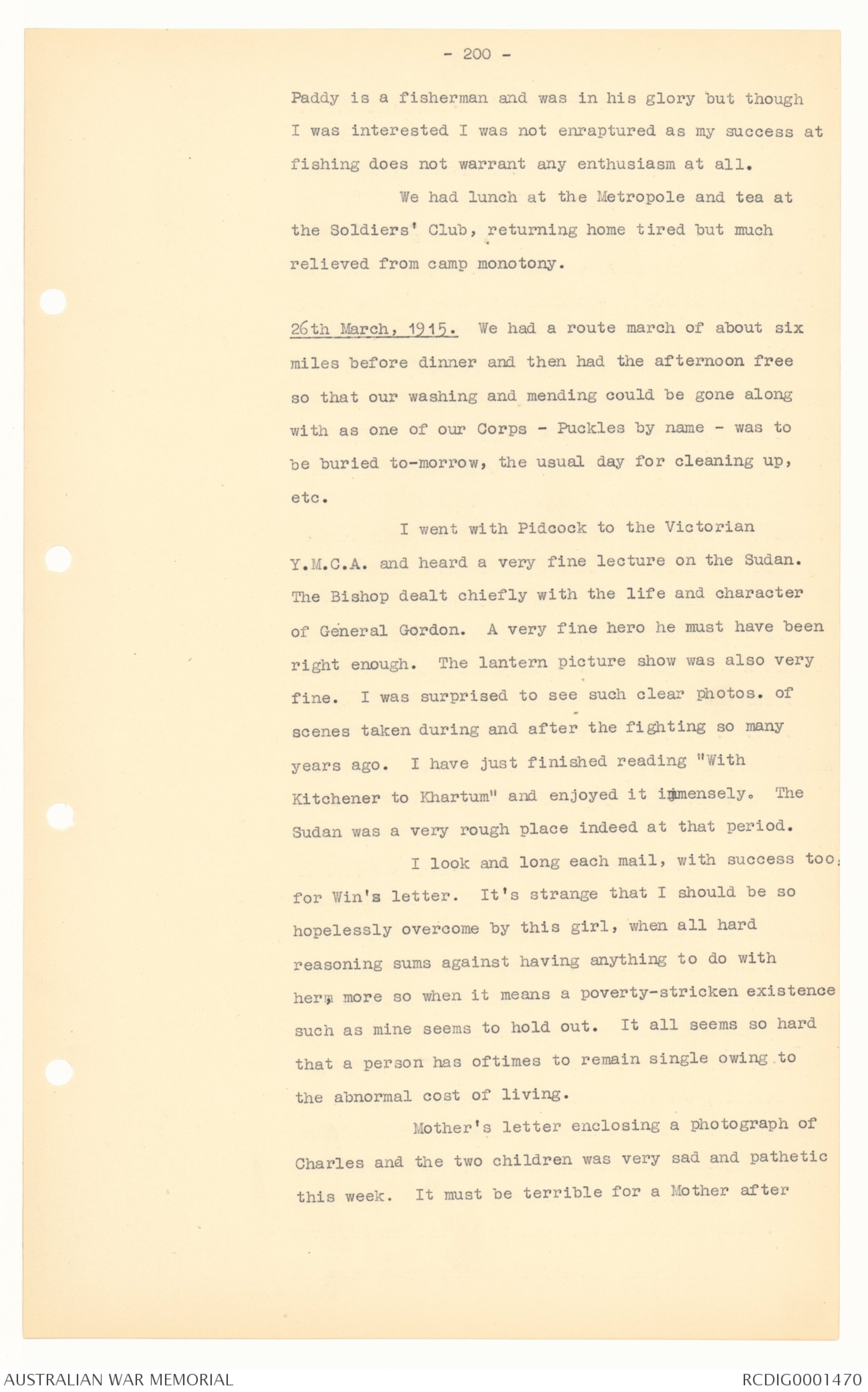
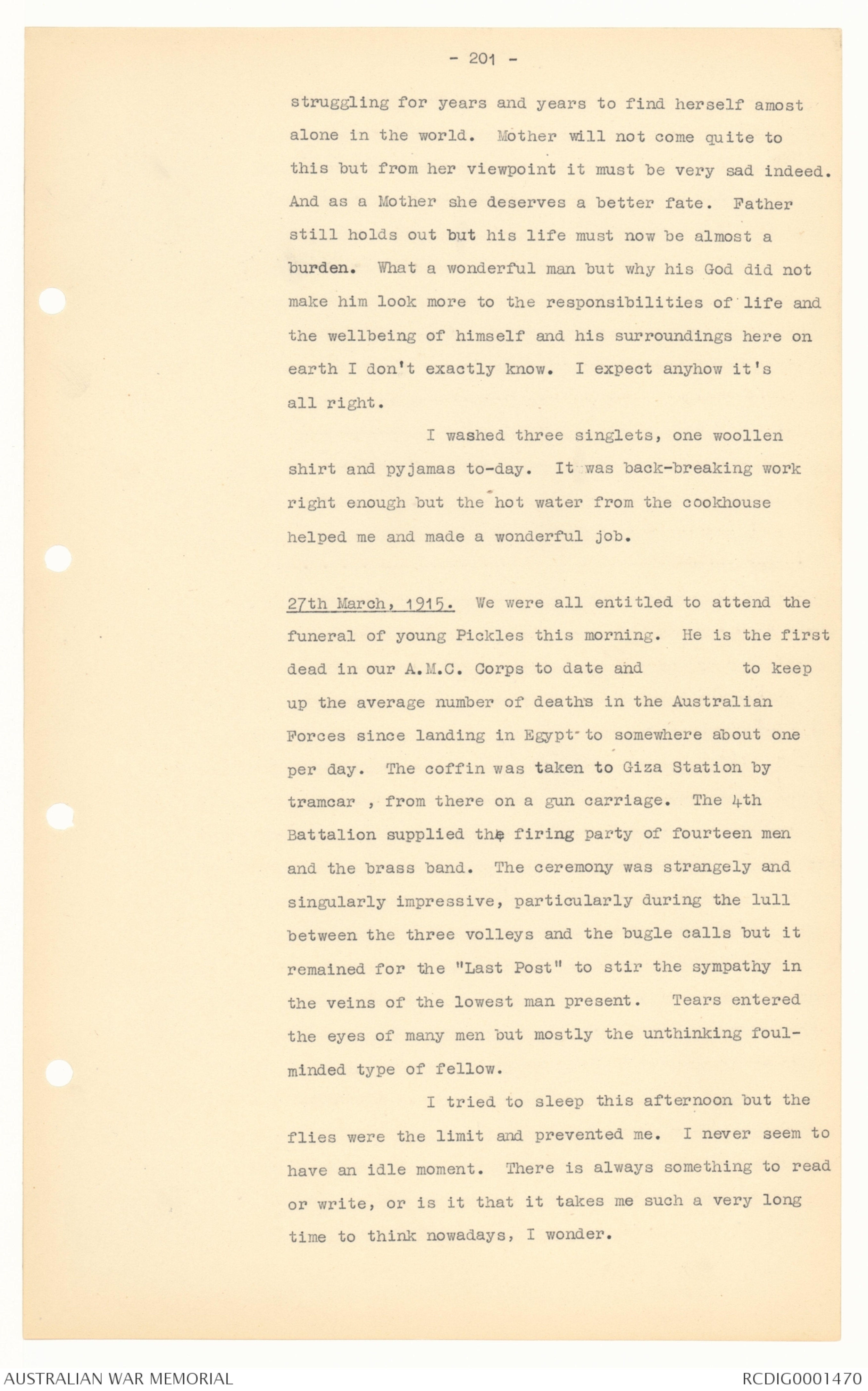
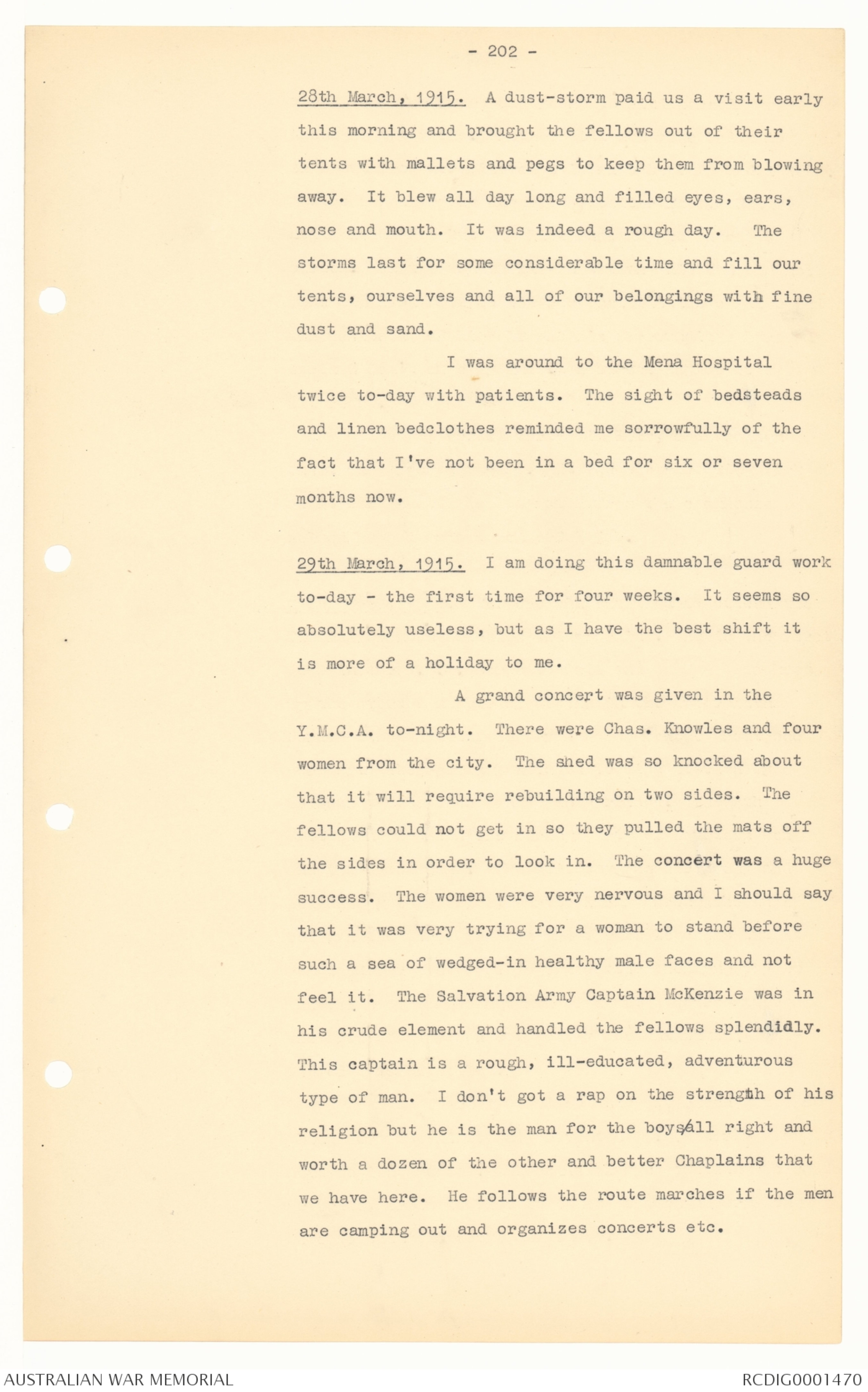
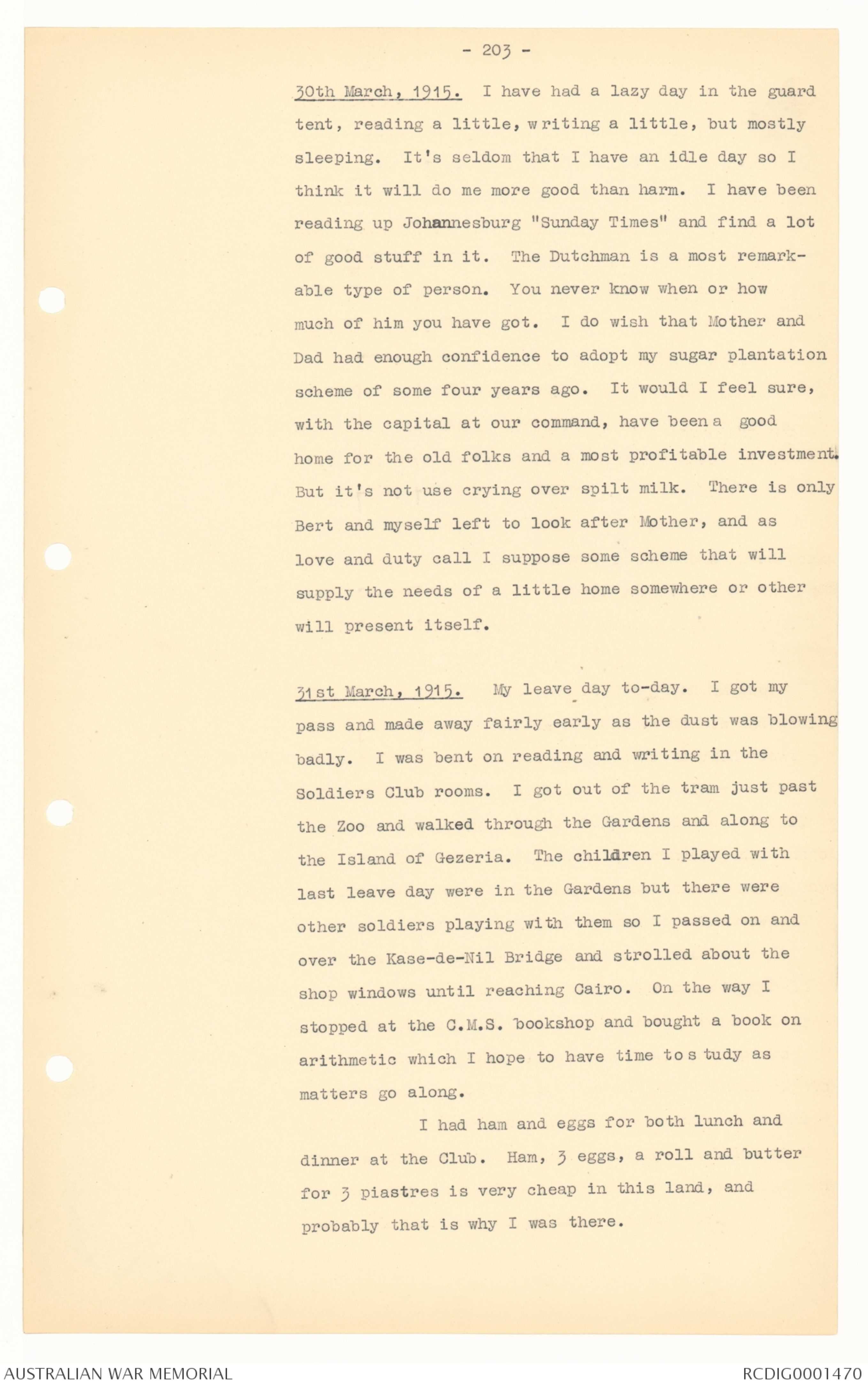
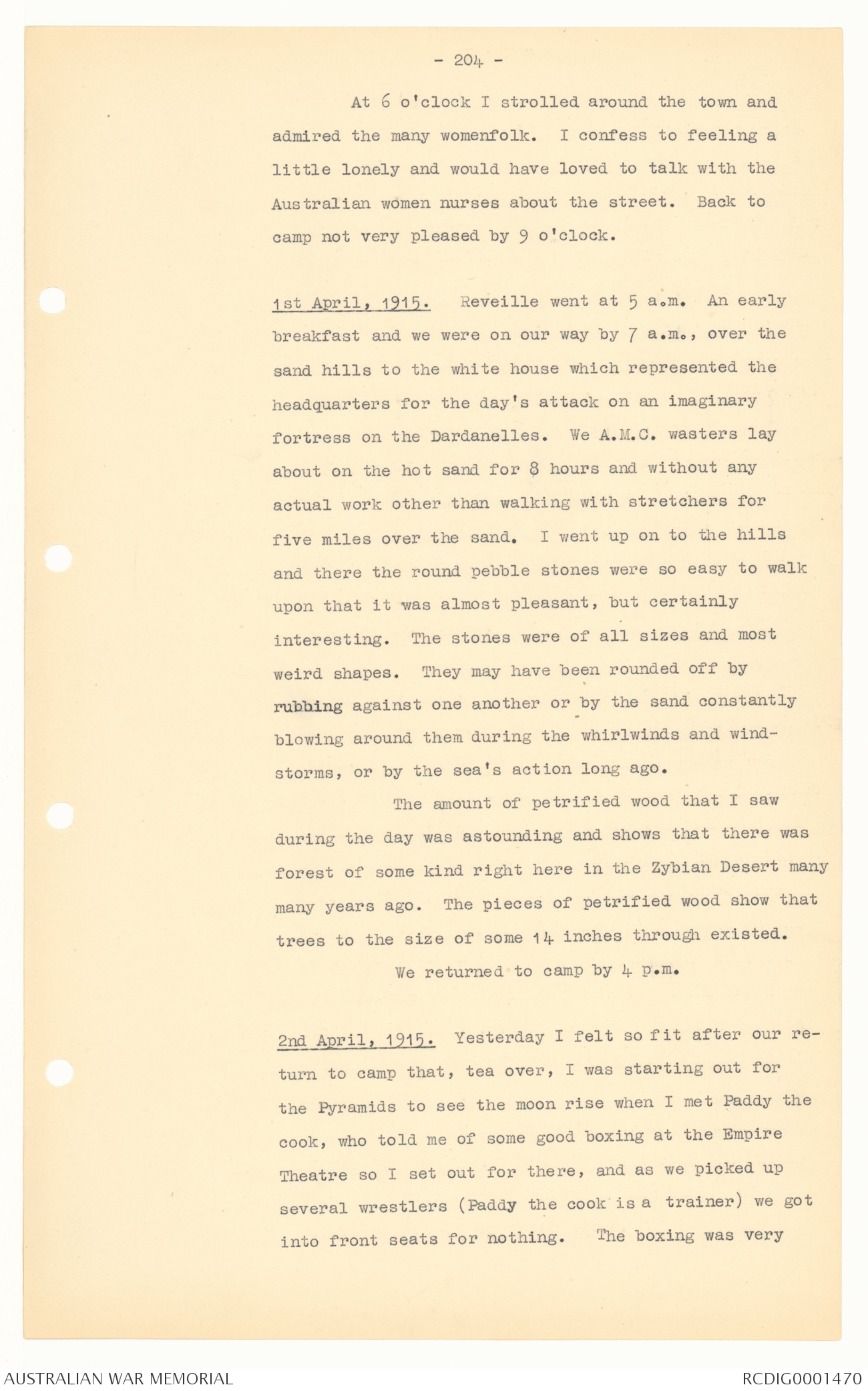
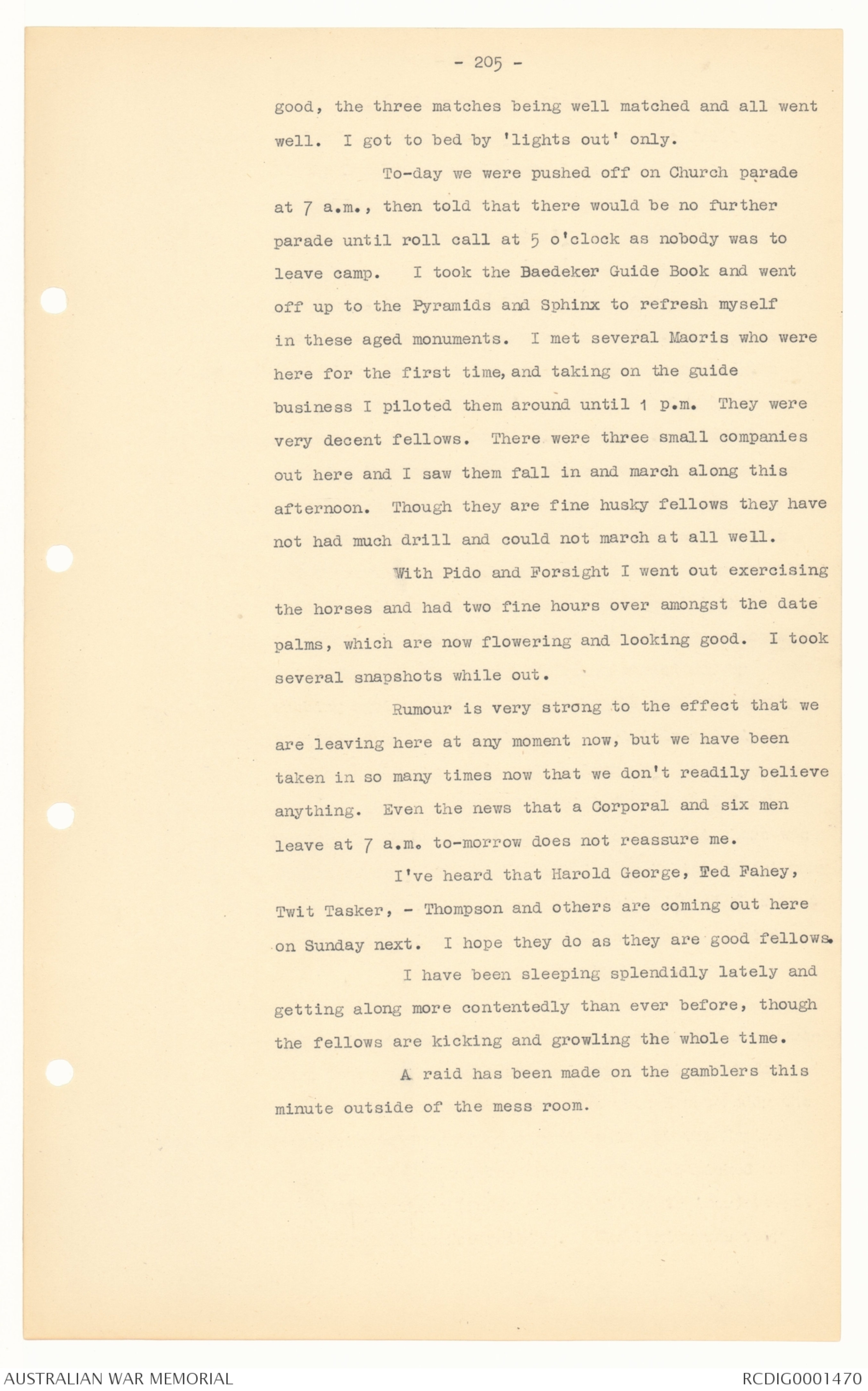
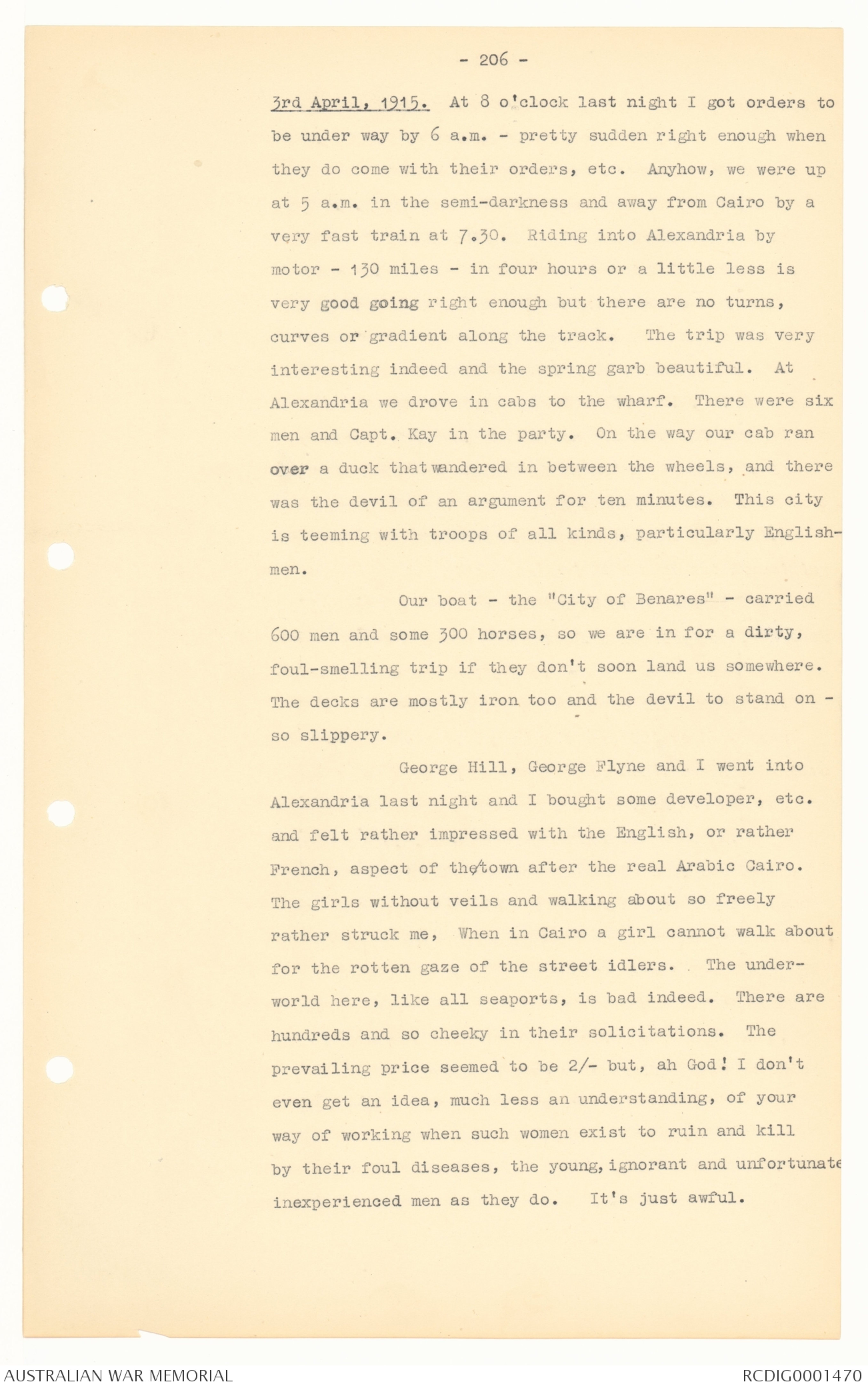
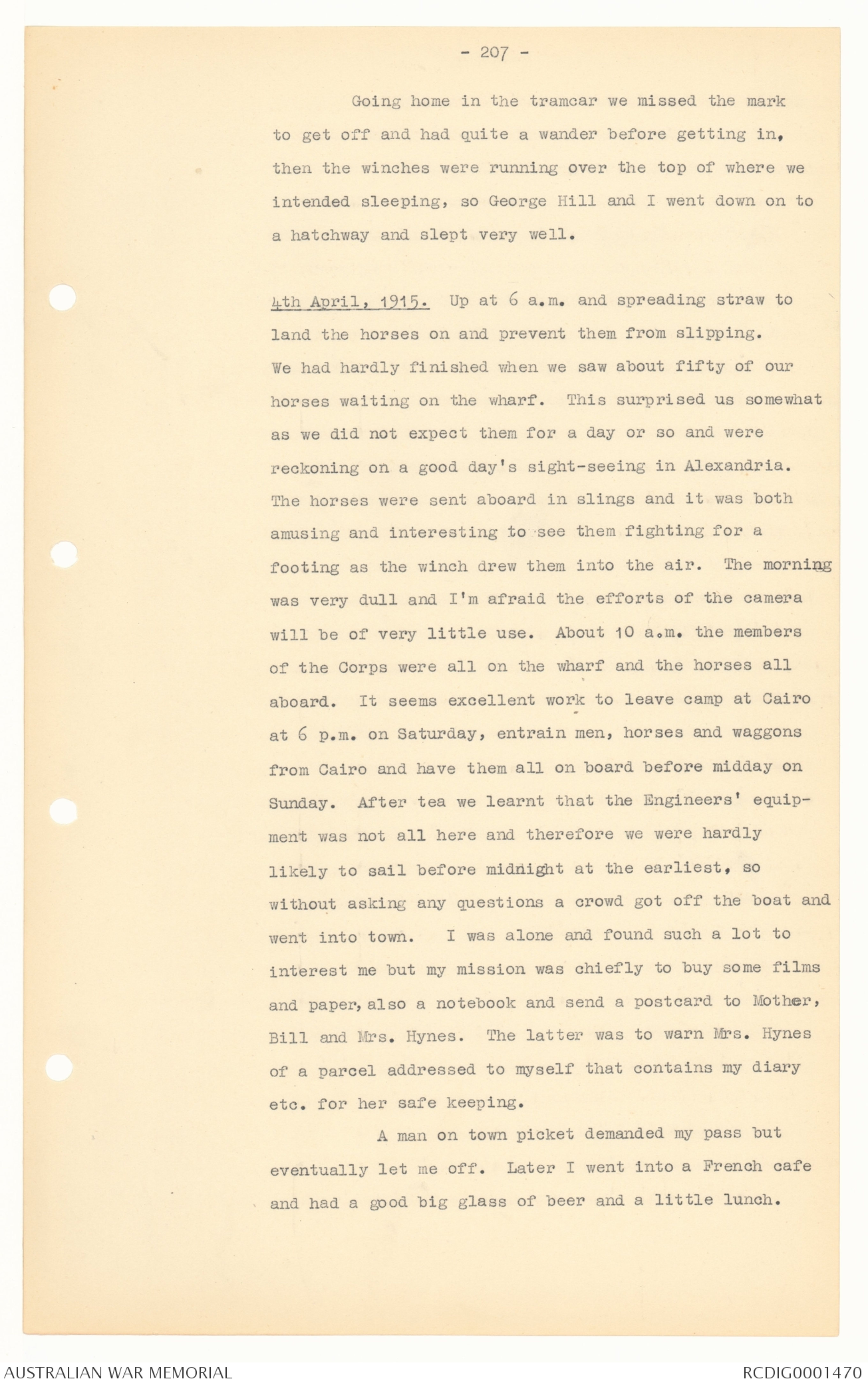
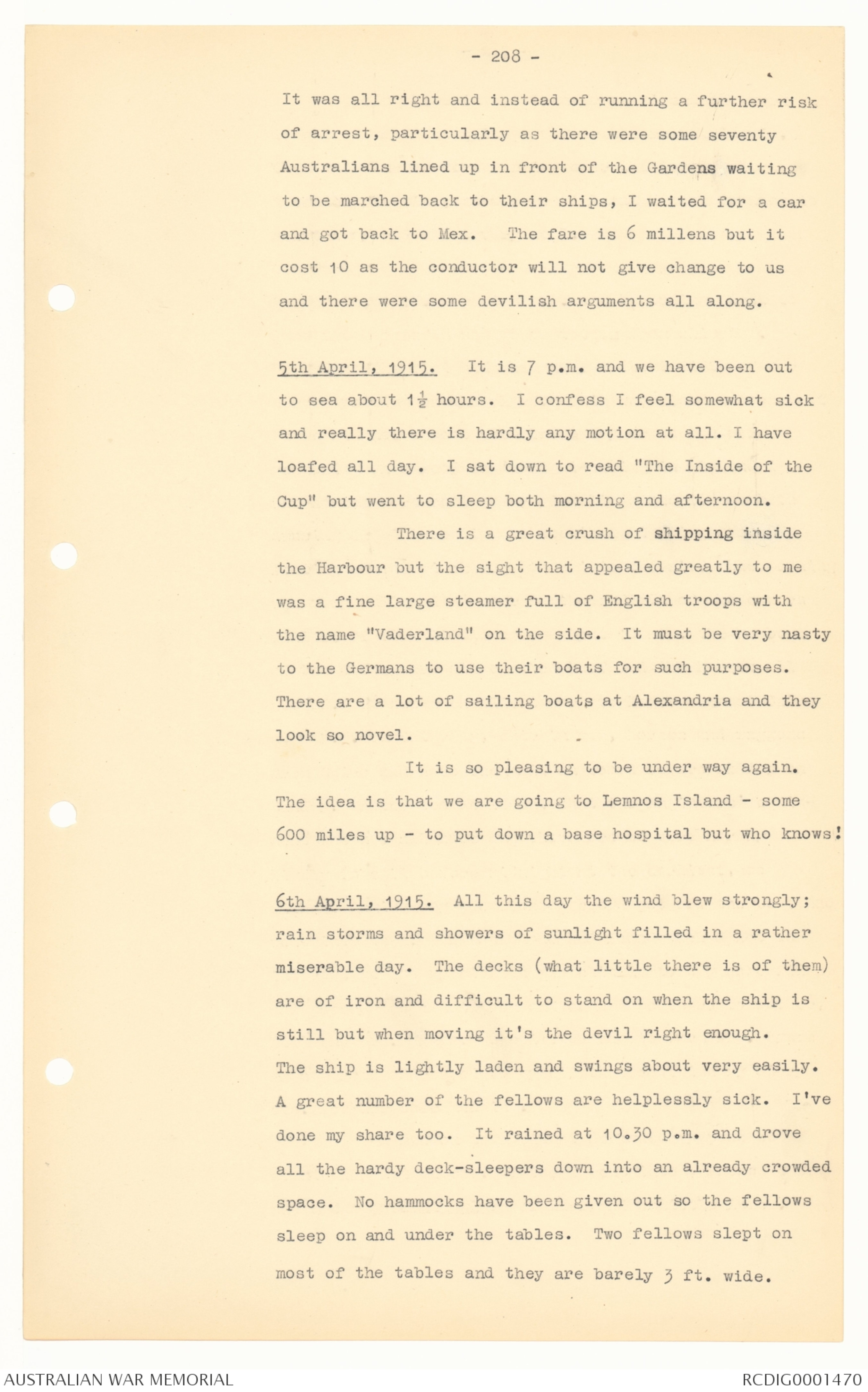
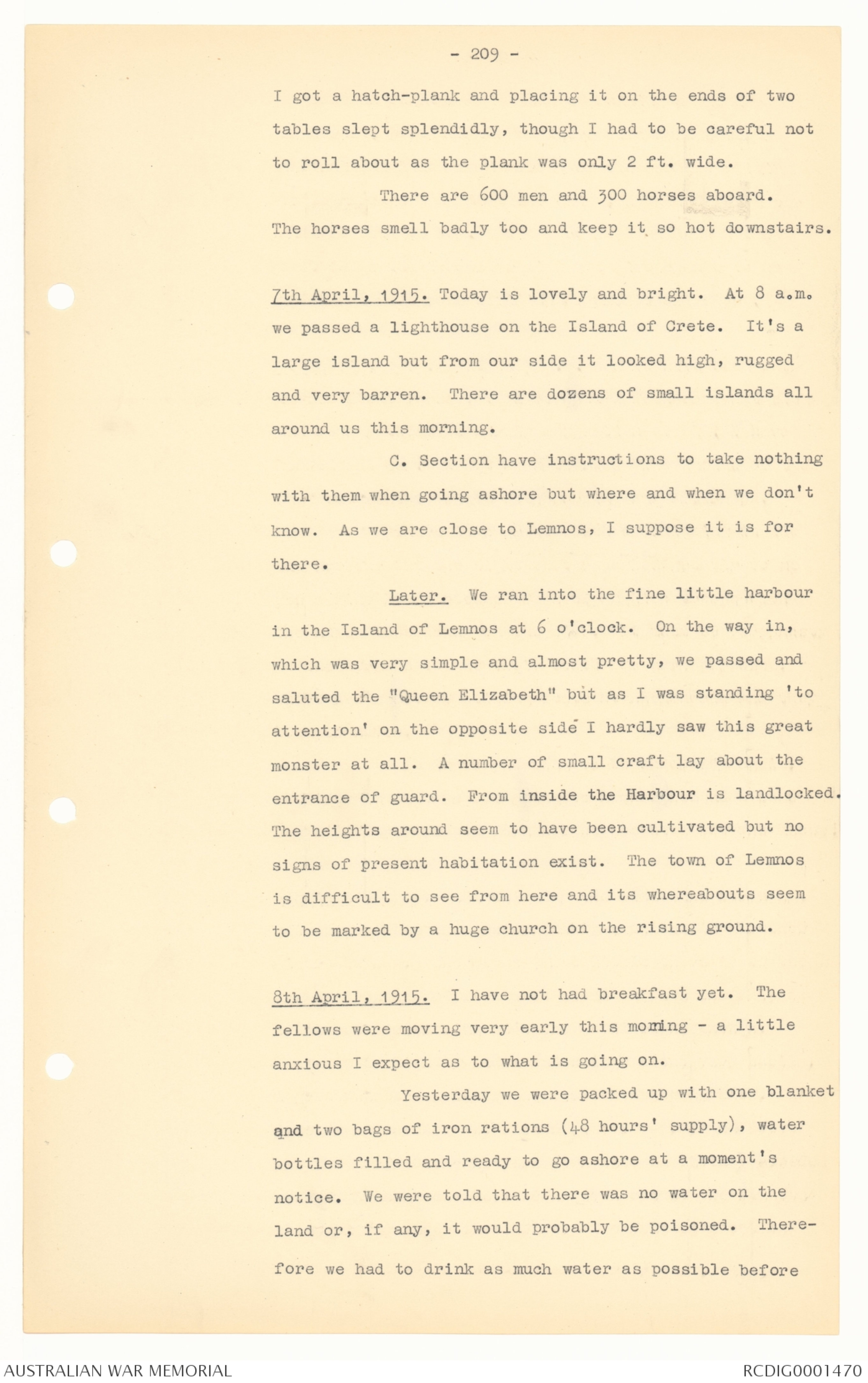
- 200 -
Paddy is a fisherman and was in his glory but though
I was interested I was not enraptured as my success at
fishing does not warrant any enthusiasm at all.
We had lunch at the Metropole and tea at
the Soldiers' Club, returning home tired but much
relieved from camp monotony.
26th March, 1915. We had a route march of about six
miles before dinner and then had the afternoon free
so that our washing and mending could be gone along
with as one of our Corps - Puckles by name - was to
be buried to-morrow, the usual day for cleaning up,
etc.
I went with Pidcock to the Victorian
Y.M.C.A. and heard a very fine lecture on the Sudan.
The Bishop dealt chiefly with the life and character
of General Gordon. A very fine hero he must have been
right enough. The lantern picture show was also very
fine. I was surprised to see such clear photos. of
scenes taken during and after the fighting so many
years ago. I have just finished reading "With
Kitchener to Khartum" and enjoyed it immensely. The
Sudan was a very rough place indeed at that period.
I look and long each mail, with success too,
for Win's letter. It's strange that I should be so
hopelessly overcome by this girl, when all hard
reasoning sums against having anything to do with
her, more so when it means a poverty-stricken existence
such as mine seems to hold out. It all seems so hard
that a person has oftimes to remain single owing to
the abnormal cost of living.
Mother's letter enclosing a photograph of
Charles and the two children was very sad and pathetic
this week. It must be terrible for a Mother after
- 201 -
struggling for years and years to find herself amost
alone in the world. Mother will not come quite to
this but from her viewpoint it must be very sad indeed.
And as a Mother she deserves a better fate. Father
still holds out but his life must now be almost a
burden. What a wonderful man but why his God did not
make him look more to the responsibilities of life and
the wellbeing of himself and his surroundings here on
earth I don't exactly know. I expect anyhow it's
all right.
I washed three singlets, one woollen
shirt and pyjamas to-day. It was back-breaking work
right enough but the hot water from the cookhouse
helped me and made a wonderful job.
27th March, 1915. We were all entitled to attend the
funeral of young Pickles this morning. He is the first
dead in our A.M.C. Corps to date and to keep
up the average number of deaths in the Australian
Forces since landing in Egypt to somewhere about one
per day. The coffin was taken to Giza Station by
tramcar, from there on a gun carriage. The 4th
Battalion supplied the firing party of fourteen men
and the brass band. The ceremony was strangely and
singularly impressive, particularly during the lull
between the three volleys and the bugle calls but it
remained for the "Last Post" to stir the sympathy in
the veins of the lowest man present. Tears entered
the eyes of many men but mostly the unthinking foul-minded
type of fellow.
I tried to sleep this afternoon but the
flies were the limit and prevented me. I never seem to
have an idle moment. There is always something to read
or write, or is it that it takes me such a very long
time to think nowadays, I wonder.
- 202 -
28th March, 1915. A dust-storm paid us a visit early
this morning and brought the fellows out of their
tents with mallets and pegs to keep them from blowing
away. It blew all day long and filled eyes, ears,
nose and mouth. It was indeed a rough day. The
storms last for some considerable time and fill our
tents, ourselves and all of our belongings with fine
dust and sand.
I was around to the Mena Hospital
twice to-day with patients. The sight of bedsteads
and linen bedclothes reminded me sorrowfully of the
fact that I've not been in a bed for six or seven
months now.
29th March, 1915. I am doing this damnable guard work
to-day - the first time for four weeks. It seems so
absolutely useless, but as I have the best shift it
is more of a holiday to me.
A grand concert was given in the
Y.M.C.A. to-night. There were Chas. Knowles and four
women from the city. The shed was so knocked about
that it will require rebuilding on two sides. The
fellows could not get in so they pulled the mats off
the sides in order to look in. The concert was a huge
success. The women were very nervous and I should say
that it was very trying for a woman to stand before
such a sea of wedged-in healthy male faces and not
feel it. The Salvation Army Captain McKenzie was in
his crude element and handled the fellows splendidly.
This captain is a rough, ill-educated, adventurous
type of man. I don’t got a rap on the strength of his
religion but he is the man for the boys/all right and
worth a dozen of the other and better Chaplains that
we have here. He follows the route marches if the men
are camping out and organizes concerts etc.
- 203 -
30th March, 1915. I have had a lazy day in the guard
tent, reading a little, writing a little, but mostly
sleeping. It's seldom that I have an idle day so I
think it will do me more good than harm. I have been
reading up Johannesburg "Sunday Times" and find a lot
of good stuff in it. The Dutchman is a most remarkable
type of person. You never know when or how
much of him you have got. I do wish that Mother and
Dad had enough confidence to adopt my sugar plantation
scheme of some four years ago. It would I feel sure,
with the capital at our command, have been a good
home for the old folks and a most profitable investment.
But it's not use crying over spilt milk. There is only
Bert and myself left to look after Mother, and as
love and duty call I suppose some scheme that will
supply the needs of a little home somewhere or other
will present itself.
31st March, 1915. My leave day to-day. I got my
pass and made away fairly early as the dust was blowing
badly. I was bent on reading and writing in the
Soldiers Club rooms. I got out of the tram just past
the Zoo and walked through the Gardens and along to
the Island of Gezeria. The children I played with
last leave day were in the Gardens but there were
other soldiers playing with them so I passed on and
over the Kase-de-Nil Bridge and strolled about the
shop windows until reaching Cairo. On the way I
stopped at the C.M.S. bookshop and bought a book on
arithmetic which I hope to have time to s tudy as
matters go along.
I had ham and eggs for both lunch and
dinner at the Club. Ham, 3 eggs, a roll and butter
for 3 piastres is very cheap in this land, and
probably that is why I was there.
- 204 -
At 6 o'clock I strolled around the town and
admired the many womenfolk. I confess to feeling a
little lonely and would have loved to talk with the
Australian women nurses about the street. Back to
camp not very pleased by 9 o'clock.
1st April, 1915. Reveille went at 5 a.m. An early
breakfast and we were on our way by 7 a.m., over the
sand hills to the white house which represented the
headquarters for the day's attack on an imaginary
fortress on the Dardanelles. We A.M.C. wasters lay
about on the hot sand for 8 hours and without any
actual work other than walking with stretchers for
five miles over the sand. I went up on to the hills
and there the round pebble stones were so easy to walk
upon that it was almost pleasant, but certainly
interesting. The stones were of all sizes and most
weird shapes. They may have been rounded off by
rubbing against one another or by the sand constantly
blowing around them during the whirlwinds and windstorms,
or by the sea's action long ago.
The amount of petrified wood that I saw
during the day was astounding and shows that there was
forest of some kind right here in the Zybian Desert many
many years ago. The pieces of petrified wood show that
trees to the size of some 14 inches through existed.
We returned to camp by 4 p.m.
2nd April, 1915. Yesterday I felt so fit after our return
to camp that, tea over, I was starting out for
the Pyramids to see the moon rise when I met Paddy the
cook, who told me of some good boxing at the Empire
Theatre so I set out for there, and as we picked up
several wrestlers (Paddy the cook is a trainer) we got
into front seats for nothing. The boxing was very
- 205 -
good, the three matches being well matched and all went
well. I got to bed by 'lights out' only.
To-day we were pushed off on Church parade
at 7 a.m., then told that there would be no further
parade until roll call at 5 o'clock as nobody was to
leave camp. I took the Baedeker Guide Book and went
off up to the Pyramids and Sphinx to refresh myself
in these aged monuments. I met several Maoris who were
here for the first time, and taking on the guide
business I piloted them around until 1 p.m. They were
very decent fellows. There were three small companies
out here and I saw them fall in and march along this
afternoon. Though they are fine husky fellows they have
not had much drill and could not march at all well.
With Pido and Forsight I went out exercising
the horses and had two fine hours over amongst the date
palms, which are now flowering and looking good. I took
several snapshots while out.
Rumour is very strong to the effect that we
are leaving here at any moment now, but we have been
taken in so many times now that we don’t readily believe
anything. Even the news that a Corporal and six men
leave at 7 a.m. to-morrow does not reassure me.
I've heard that Harold George, Ted Fahey,
Twit Tasker, - Thompson and others are coming out here
on Sunday next. I hope they do as they are good fellows.
I have been sleeping splendidly lately and
getting along more contentedly than ever before, though
the fellows are kicking and growling the whole time.
A raid has been made on the gamblers this
minute outside of the mess room.
- 206 -
3rd April, 1915. At 8 o'clock last night I got orders to
be under way by 6 a.m. - pretty sudden right enough when
they do come with their orders, etc. Anyhow, we were up
at 5 a.m. in the semi-darkness and away from Cairo by a
very fast train at 7.30. Riding into Alexandria by
motor - 130 miles - in four hours or a little less is
very good going right enough but there are no turns,
curves or gradient along the track. The trip was very
interesting indeed and the spring garb beautiful. At
Alexandria we drove in cabs to the wharf. There were six
men and Capt. Kay in the party. On the way our cab ran
over a duck that wandered in between the wheels, and there
was the devil of an argument for ten minutes. This city
is teeming with troops of all kinds, particularly Englishmen.
Our boat - the "City of Benares" - carried
600 men and some 300 horses, so we are in for a dirty,
foul-smelling trip if they don’t soon land us somewhere.
The decks are mostly iron too and the devil to stand on -
so slippery.
George Hill, George Flyne and I went into
Alexandria last night and I bought some developer, etc.
and felt rather impressed with the English, or rather
French, aspect of the/town after the real Arabic Cairo.
The girls without veils and walking about so freely
rather struck me. When in Cairo a girl cannot walk about
for the rotten gaze of the street idlers. The underworld
here, like all seaports, is bad indeed. There are
hundreds and so cheeky in their solicitations. The
prevailing price seemed to be 2/- but, ah God! I don't
even get an idea, much less an understanding, of your
way of working when such women exist to ruin and kill
by their foul diseases, the young, ignorant and unfortunate
inexperienced men as they do. It's just awful.
- 207 -
Going home in the tramcar we missed the mark
to get off and had quite a wander before getting in,
then the winches were running over the top of where we
intended sleeping, so George Hill and I went down on to
a hatchway and slept very well.
4th April, 1915. Up at 6 a.m. and spreading straw to
land the horses on and prevent them from slipping.
We had hardly finished when we saw about fifty of our
horses waiting on the wharf. This surprised us somewhat
as we did not expect them for a day or so and were
reckoning on a good day's sight-seeing in Alexandria.
The horses were sent aboard in slings and it was both
amusing and interesting to see them fighting for a
footing as the winch drew them into the air. The morning
was very dull and I'm afraid the efforts of the camera
will be of very little use. About 10 a.m. the members
of the Corps were all on the wharf and the horses all
aboard. It seems excellent work to leave camp at Cairo
at 6 p.m. on Saturday, entrain men, horses and waggons
from Cairo and have them all on board before midday on
Sunday. After tea we learnt that the Engineers' equipment
was not all here and therefore we were hardly
likely to sail before midnight at the earliest, so
without asking any questions a crowd got off the boat and
went into town. I was alone and found such a lot to
interest me but my mission was chiefly to buy some films
and paper, also a notebook and send a postcard to Mother,
Bill and Mrs. Hynes. The latter was to warn Mrs. Hynes
of a parcel addressed to myself that contains my diary
etc. for her safe keeping.
A man on town picket demanded my pass but
eventually let me off. Later I went into a French cafe
and had a good big glass of beer and a little lunch.
- 208 -
It was all right and instead of running a further risk
of arrest, particularly as there were some seventy
Australians lined up in front of the Gardens waiting
to be marched back to their ships, I waited for a car
and got back to Mex. The fare is 6 millens but it
cost 10 as the conductor will not give change to us
and there were some devilish arguments all along.
5th April, 1915. It is 7 p.m. and we have been out
to sea about 1 ½ hours. I confess I feel somewhat sick
and really there is hardly any motion at all. I have
loafed all day. I sat down to read "The Inside of the
Cup" but went to sleep both morning and afternoon.
There is a great crush of shipping inside
the Harbour but the sight that appealed greatly to me
was a fine large steamer full of English troops with
the name "Vaderland" on the side. It must be very nasty
to the Germans to use their boats for such purposes.
There are a lot of sailing boats at Alexandria and they
look so novel.
It is so pleasing to be under way again.
The idea is that we are going to Lemnos Island - some
600 miles up - to put down a base hospital but who knows!
6th April, 1915. All this day the wind blew strongly;
rain storms and showers of sunlight filled in a rather
miserable day. The decks (what little there is of them)
are of iron and difficult to stand on when the ship is
still but when moving it's the devil right enough.
The ship is lightly laden and swings about very easily.
A great number of the fellows are helplessly sick. I've
done my share too. It rained at 10.30 p.m. and drove
all the hardy deck-sleepers down into an already crowded
space. No hammocks have been given out so the fellows
sleep on and under the tables. Two fellows slept on
most of the tables and they are barely 3 ft. wide.
- 209 -
I got a hatch-plank and placing it on the ends of two
tables slept splendidly, though I had to be careful not
to roll about as the plank was only 2 ft. wide.
There are 600 men and 300 horses aboard.
The horses smell badly too and keep it so hot downstairs.
7th April, 1915. Today is lovely and bright. At 8 a.m.
we passed a lighthouse on the Island of Crete. It's a
large island but from our side it looked high, rugged
and very barren. There are dozens of small islands all
around us this morning.
C. Section have instructions to take nothing
with them when going ashore but where and when we don't
know. As we are close to Lemnos, I suppose it is for
there.
Later. We ran into the fine little harbour
in the Island of Lemnos at 6 o'clock. On the way in,
which was very simple and almost pretty, we passed and
saluted the "Queen Elizabeth" but as I was standing 'to
attention' on the opposite side I hardly saw this great
monster at all. A number of small craft lay about the
entrance of guard. From inside the Harbour is landlocked.
The heights around seem to have been cultivated but no
signs of present habitation exist. The town of Lemnos
is difficult to see from here and its whereabouts seem
to be marked by a huge church on the rising ground.
8th April, 1915. I have not had breakfast yet. The
fellows were moving very early this morning - a little
anxious I expect as to what is going on.
Yesterday we were packed up with one blanket
and two bags of iron rations (48 hours' supply), water
bottles filled and ready to go ashore at a moment's
notice. We were told that there was no water on the
land or, if any, it would probably be poisoned. Therefore
we had to drink as much water as possible before
 Not Yet Replaced By AI
Not Yet Replaced By AIThis transcription item is now locked to you for editing. To release the lock either Save your changes or Cancel.
This lock will be automatically released after 60 minutes of inactivity.